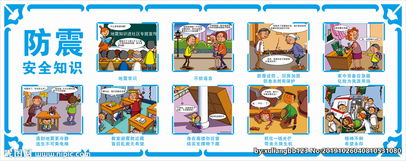防地震安全知识英语(英语版防震小知识)
1.英语版防震小知识
DURING an earthquake: 1. STAY CALM. 2. Inside: Stand in a doorway, or crouch under a desk or table, away from windows or glass dividers. 3. Outside: Stand away from buildings, trees, telephone and electric lines. 4. On the road: Drive away from underpasses/overpasses; stop in safe area; stay in vehicle.AFTER an earthquake: 1. Check for injuries -- provide first aid. 2. Check for safety -- check for gas, water, sewage breaks; check for downed electrical lines and shorts; turn off appropriate utilities; check for building damage and potential safety problems during aftershocks, such as cracks around chimney and foundation. 3. Clean up dangerous spills. 4. Wear shoes. 5. Turn on radio and listen for instructions from public safety agencies. 6. Use the telephone only for emergency use。
2.英语版防震小知识
DURING an earthquake:
1. STAY CALM.
2. Inside: Stand in a doorway, or crouch under a desk or table, away from windows or glass dividers.
3. Outside: Stand away from buildings, trees, telephone and electric lines.
4. On the road: Drive away from underpasses/overpasses; stop in safe area; stay in vehicle.
AFTER an earthquake:
1. Check for injuries -- provide first aid.
2. Check for safety -- check for gas, water, sewage breaks; check for downed electrical lines and shorts; turn off appropriate utilities; check for building damage and potential safety problems during aftershocks, such as cracks around chimney and foundation.
3. Clean up dangerous spills.
4. Wear shoes.
5. Turn on radio and listen for instructions from public safety agencies.
6. Use the telephone only for emergency use.
3.地震知识 英文
An earthquake is a phenomenon that results from and is powered by the sudden release of stored energy in the crust that propagates seismic waves. At the Earth's surface, earthquakes may manifest themselves by a shaking or displacement of the ground and sometimes tsunamis, which may lead to loss of life and destruction of property.
Earthquakes may occur naturally or as a result of human activities. In its most generic sense, the word earthquake is used to describe any seismic event—whether a natural phenomenon or an event caused by humans—that generates seismic waves.
地震是供给动力结果从和由被存放的能量突然的发行在外壳繁殖地波的现象。在地球的表面, 地震也许体现自己由地面和有时海啸的震动或位移, 也许导致物产的丧生和破坏。
地震也许发生自然地或由于人类活动。在它的最普通的感觉, 词地震使用描述任何地震事件是否一种自然现象或事件造成由人引起地波。
4.求“关于地震的常识”(英文)
An earthquake is the shaking of the ground caused by an abrupt shift of rock along a fracture in the Earth, called a fault. Within seconds, an earthquake releases stress that has slowly accumulated within the rock, sometimes over hundreds of years. The size of an earthquake is indicated by a number called its magnitude.
Earthquakes have the power to uproot trees and send them crashing into buildings. They can trigger landslides and avalanches, and cause flooding and tsunamis. Human structures are also at risk. It is interesting to note that tall buildings will sustain the least damage if they are located directly at the epicenter. This is because they can withstand the up-and-down motion of P-waves. S-waves, on the other hand, occur far away from the epicenter, and cause the greatest stress by shaking buildings from side to side. These buildings are often knocked off their foundations.
Scientists are continuously thinking of ways to try and reduce earthquake power. Some are trying to lessen the friction between colliding plates. They poured water down a fault where two plates were grinding together. The water “lubricated” the fault, letting one piece jerk free with a number of little earthquakes and preventing a large tremor. Architects are also designing earthquake-proof buildings, constructing on rock instead of gravel, or on soft sand or clay. Researchers are always trying to reduce the impact of earthquakes. They continue to study and experiment with ways to tame the Earth. However, we all still have much more to learn before we can control the power of one of nature's most amazing phenomena.
5.英语 地震自救资料
If the earthquake came, what should we do? » How can we save themselves »
Is extremely frequent earthquakes, the community as a whole has a great impact. When the earthquake occurred, the most basic phenomenon is the continuous ground vibration, is obviously the sloshing. Once the earthquake occurred, we must first maintain a clear, cool head and promptly determine shock situation, must not in jumping from buildings in panic, it is extremely important
After the earthquake quickly evacuated to a safe place contingency protection is a better way. The so-called nearest escape, according to local conditions and in accordance with the different situations of different countermeasures. For example, choose the spot where shock absorbers open: squat or Paxia, so as not to fall; Do not span, many people avoi馑秆盾貉墉股堕瘫乏凯d the place; Do not return to the indoor. Avoid tall buildings or structures to avoid hazards, tall, Xuangua Wu or other dangerous substances. If some people were injured, to the wounded placed in a safe place timely relief.
In short when the earthquake occurred, it is essential to have a clear-headed, calm composed attitude. We help each other, the common seismic!
中文
如果地震来了,我们应该做些什么呢?我们如何能自救?
地震是极其频繁的,对整个社会有着很大的影响。地震发生时,最基本的现象是地面的连续振动,主要是明显的晃动。地震一旦发生,首先要保持清醒、冷静的头脑,及时判别震动状况,千万不可在慌乱中跳楼,这一点极为重要
地震后迅速撤离到安全的地方是应急防护的较好方法。所谓就近躲避,就是因地制宜地根据不同的情况做出不同的对策。比如就地选择开阔地方避震:蹲下或趴下,以免摔倒;不要乱跑,避开人多的地方;不要随便返回室内。避开高大建筑物或构筑物避开危险物、高耸、悬挂物或其它危险物品。如果有人受伤了,要把伤员安置在较为安全的地方及时救助。
总之在地震发生的时候,至关重要的是要有清醒的头脑,镇静自若的态度。大家相互帮助,共同抗震!

相关推荐
声明:本网站尊重并保护知识产权,根据《信息网络传播权保护条例》,如果我们转载的作品侵犯了您的权利,请在一个月内通知我们,我们会及时删除。
蜀ICP备2020033479号-4 Copyright © 2016 学习鸟. 页面生成时间:3.909秒









